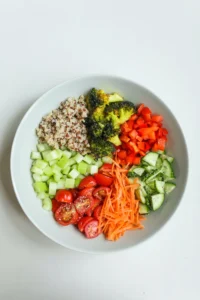Generated by Contentify AI
- Introduction
- What Is Nutrition?
- Benefits of Healthy Eating
- 10 Ways to Improve Your Nutrition in 2024
- Tips for Making Healthy Eating Habits Last
- Understanding Your Nutritional Needs
- Conclusion

Introduction
Eating a healthy diet is vital to feeling your best and maintaining optimal health. In 2024, ensuring you get the nutrients you need to stay healthy and strong is more important.
But with so many dietary options and nutrition trends, deciding what’s best for you can be challenging. Here are 10 simple tips to help you maximize your nutrition this year.
What Is Nutrition?
Nutrition is simply consuming food and its nutrients to promote health and well-being. It is the science behind what and how much you eat and how it affects your body and overall health. Good nutrition can help to improve your physical and mental health, reduce the risk of many diseases, and improve overall quality of life.
With the start of the new year, now is the perfect time to look at your diet and consider how you can improve your nutrition.
Benefits of Healthy Eating
Eating healthy and nutritious food is essential for a healthy and balanced lifestyle. Eating a balanced diet can help reduce your risk of developing chronic illnesses like diabetes, heart disease, and cancer. It can also help maintain a healthy weight and reduce the risk of osteoporosis.
10 Ways to Improve Your Nutrition in 2024
1. Start Your Day Right: Make sure your breakfasts are healthy and balance your nutritional needs. Eat a balanced mix of proteins, complex carbohydrates, and healthy fats. Aim to include fruits and vegetables and stay away from processed foods.
2. Drink More Water: Drinking plenty of water throughout the day is essential for your health. Staying hydrated helps to keep your energy levels up and helps to flush out toxins from your body. Avoid sugary drinks and opt for plain water or unsweetened herbal teas.
3. Eat More Whole Foods: Eating more whole foods such as fruits, vegetables, whole grains, nuts, and beans will provide your body with essential nutrients and help keep you full. Limiting your intake of processed foods that could contain added sugar and unhealthy fats is also essential.
4. Increase Your Fiber Intake: Eating a high-fiber diet can help to keep you fuller for longer and help to regulate your digestive system. Eating whole grains, fruits, and vegetables will help you to increase your fiber intake.
5. Eat Mindfully: Eating mindfully is a great way to ensure you eat the right foods in the right quantities. Be mindful of your portion sizes, and do not overeat. Focus on your food, savor the flavors, and enjoy your meals without distractions.
6. Reduce Your Sugar Intake: Overeating sugar can hurt your health. Limiting your sugary snacks and drinks can reduce your risk of developing chronic illnesses such as type 2 diabetes or heart disease.
7. Get Creative in the Kitchen: Experimenting with new recipes and flavors is a great way to ensure you don’t get bored of eating the same meals daily. It can also help ensure you get various nutrients and vitamins.
8. Get Active: Regular physical activity is essential for health and well-being. Try to exercise at least 30 minutes daily, and make sure you choose activities you enjoy.
9. Get Enough Sleep: Sleeping each night is essential for your health and well-being. Aim to get 7-8 hours of sleep each night and ensure a regular bedtime routine.
10. Get Support: Nutrition is a personal journey and can sometimes be overwhelming. Speak to your doctor or a registered dietitian.
Tips for Making Healthy Eating Habits Last
Eating healthy is a great way to get your body into shape and feel great year-round. But making healthy eating habits last takes more than just willpower. Understanding Your Nutritional Needs
Your body needs a variety of foods to stay healthy and energized. Eating a balanced diet means consuming foods from various food groups, such as fruits, vegetables, whole grains, low-fat dairy, lean proteins, and healthy fats.
Fruits and vegetables are a great source of vitamins, minerals, antioxidants, and fiber. Make sure to include a variety of colors in your meals for a well-rounded nutrient profile. Whole grains are an excellent source of complex carbohydrates, dietary fiber, and B vitamins. Try to choose whole-grain products over refined grains.
Low-fat dairy products provide calcium, vitamin D, and protein. Choose fat-free or low-fat milk, cheese, and yogurt. When selecting dairy, look for products labeled “low-fat” or “fat-free.”
Lean proteins, such as chicken, fish, beans, and nuts, provide essential amino acids and are a great energy source. When selecting lean proteins, opt for skinless chicken breasts, fish fillets, and beans.
Healthy fats, such as olive oil, avocados, and nuts, provide essential fatty acids and can help you feel full longer. Include healthy fats in your meals for a well-rounded nutrient profile.
Understanding your nutritional needs and including various foods from all the food groups in your diet can help you reach your optimal health and wellness goals in 2024. Start by including more fruits and vegetables in your meals, choosing whole grains instead of refined grains, selecting low-fat dairy, and choosing lean proteins and healthy fats. Eating a balanced diet can help you get the nutrients you need for optimal health.
Conclusion
2023 was a challenging year for many of us, but it also allowed us to reflect on our lives and make positive changes. As we look ahead to 2024, there is no better time to take control of our health and well-being by improving our nutrition. From eating whole foods to making time for meals, we can take action this year in several ways.






